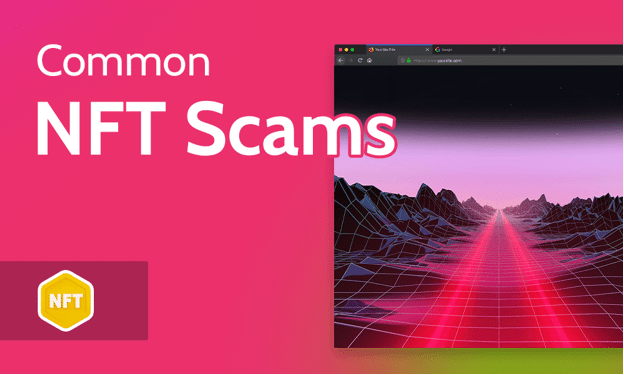
NFTs (Non-Fungible Tokens) got a breakthrough in 2021, disrupting the art world and industries beyond. However, when something gets popular, there are also risks involved. Crypto enthusiasts may get excited by the increased adoption of NFTs, but it’s hard to discern who is trustworthy and who is bad in the new industry. That’s why we should not talk about NFTs without talking about NFT scams.
The rising mainstream interest in NFTs has left many NFT project communities exposed to NFT scams such as phishing attacks. This has stirred up active discussions on how to avoid NFT scams.
Since the NFT industry is still in its infancy, knowing the common NFT scam tactics and the latest techniques of how to avoid NFT scams is very important. In this article, we have compiled everything that you need to learn about NFT scams and how to keep your NFTs safe.
What Makes NFTs Vulnerable to NFT Scams?
As NFT users find new use cases for their digital assets, non-fungible tokens are pointing to a new era of the digital world. The potential of NFTs has attracted the interest of many, including celebrities and tech giants.
However, since the NFT industry can be considered to be in its Initial Coin Offering (ICO) stage, the framework they are built on is vulnerable to malicious users seeking to take advantage of new technology and emerging trends.
Security and compliance are also complicated topics, making digital assets vulnerable to NFT scams. In January, blue-chip NFTs such as the Bored Ape Yacht Club and CryptoPunks were stolen in a hack attack. In the same month, the OpenSea Stolen Ape Policy was exploited by scammers to sell Bored Ape Yacht Club NFTs.
NFTs themselves are not a scam but they are sometimes easy to steal and as the NFT market continues to grow, the number of NFT scam attacks will grow with it. NFT scammers will also become more and more creative and advance their technological capability. In 2021, hackers stole from Nifty Gateway users, disappearing with their NFTs and even using credit cards from users who had not enabled tw0-factor authentication (2FA) to purchase NFTs. More such events are expected to happen in the future, hence the need to learn how to avoid NFT scams.
Most Common NFT Scam Attacks

The following are the most common NFT scams:
#1: Phishing scams and suspicious pop-ups
In most cases, buying your first NFT involves signing up for an account with a crypto wallet that runs on the Ethereum blockchain. MetaMask is the most common crypto wallet among NFT collectors. MetaMask users were targeted in a phishing attack that involved phony advertisements that prompted users to provide their 12-word security seed phrases. There are also many fake malicious pop-ups running on Telegram, Discord, and other public forums that lead to normal-looking login pages such as MetaMask.
Other NFT scams involve phony NFT marketplaces. The fake NFT marketplaces don’t have legit NFTs, and the moment you buy one from their site, they record your private credentials. These can in turn be used to drain your wallet of crypto and NFTs.
Learning how to avoid NFT scams like such will keep you safe when handling these blockchain assets. That’s why you should choose legitimate NFT marketplaces for buying and selling NFTs. Also, avoid entering your credentials in links, emails, and pop-ups.
#2: Fake offers
Fake offers have also become common NFT scams. NFT scammers normally impersonate legitimate NFT trading platforms and send fake emails to users claiming that someone has made an offer for their NFT. Such phishing emails aim to lure you into following a link that takes you to a fake NFT marketplace.
Just like other NFT scams, you will be taken to a fake page that will prompt you to connect your digital wallet and enter your seed phrase, which scammers can use to drain your crypto wallet.
Knowing how to avoid NFT scams such as fake offers will keep you safe in the NFT space. Always check and verify the sender’s address after receiving an email from an NFT trading platform.
#3: Fake technical support
Fake technical support messages or fake customer service representatives are common NFT scams. For example, consider a situation in which you experience technical difficulties on an NFT marketplace and ask for help on a forum such as Telegram or Discord. Someone who claims to be a representative of the NFT marketplace decides to offer you their assistance.
The fake customer representative may request you to share your screen to steal your crypto wallet’ credentials. The scammer can also redirect you to another website that looks exactly like the NFT marketplace. By entering your credentials on such a site, you will be left vulnerable to NFT scams.
That is why it is important to only ask for help from the official NFT marketplace and double-check the site domain. In some NFT scams, users receive fake security alerts about their accounts or NFT collections. Such an NFT scam can be avoided by not clicking the link.
#4: Fake Giveaways
NFT scammers also pose as employees from popular NFT trading platforms and ask you to join their NFT giveaway campaign via social media. You may be promised a free NFT provided you spread the giveaway and sign up for an account with a specific site, a phishing site.
When you connect your digital wallet to the site, they will steal your credentials and steal your NFTs from the wallet.
To avoid NFT scams that come in the form of a fake giveaway, you should check the social media accounts of that person as well as the domain name of the site to check whether it’s legitimate.
#5: Rug Pull NFT scams
Rug pulls have also become a popular way of carrying out NFT scam attacks. They occur when an individual or a group of individuals release a preliminary NFT collection to kick off a bigger project than the project plans to unfold over time with a game component, event, or merch. The rug pull comes when they disappear with the millions of dollars raised before any of the promised actions happen. These types of NFT scams normally happen quickly but there are also cases of slow rug pulls where the project is abandoned slowly with a lack of new developments or updates.
On how to avoid NFT scams that come as rug pulls, it is good to research the team behind an NFT project before investing a single coin into it. Investigate the project’s long-term plans and follow them on Twitter, Discord, and other platforms.
#6: Pump and Dump Schemes
Pump and dump schemes are another type of NFT scam to watch out for. They occur when a person or a group of persons buy many NFTs in a collection to artificially drive up their demand.https://nftcrypto.io/
This is normally done within a short time to create the impression that the NFT is in high demand. They then cash out once the project hits the selling price they desire. The highest bidders are then left behind with worthless digital assets.
Thus, it is good to research the transaction history of an NFT before you buy it. Several transactions within a short time could be an indication of a pump-and-dump scheme.
How to Avoid NFT Scams

Now that you’ve known the various types of NFT scams, how can you avoid them? Here is how to keep your NFT collection protected online:
#1: Don’t click blindly
Avoid clicking links and attachments from unknown sources. And whenever you need to seek help on an NFT platform, always use the official customer service on the official site of the platform. Avoid seeking help from people who contact you on social media platforms.
#2: Do your research on NFT projects
You have to scrutinize the NFT project’s social media channels, official website, roadmap, and the creators’ biography before investing a single coin into it. This will help you know the long-term value of your investment.
#3: Check the contact address
The contact address should reveal where the NFT was minted. If you are not sure, confirm with the creator’s website to know whether the address is genuine.
#4: Stay smart with your digital wallet credentials
Ensure that your wallet’ seed phrase is kept safe and NEVER share it with anyone, or keep a picture of it on your phone. Additionally, use strong passwords on NFT platforms and enable two-factor authentication (2FA).
#5: Use legitimate browser extensions and wallet apps
There are many malicious apps impersonating the official ones. Always download your browser extension or wallet app from their official sites to avoid getting phished.
Buy and Sell NFTs for a Profit
You can grow your crypto earnings by buying cheap NFTs and selling them for a profit. NFTCrypto.io has made this even easier for you via their NFT trading signal system. They find profitable flips in the NFT market and share the signal with you in real-time. Join NFT Signals now and become a successful NFT trader. The platform users have so far earned a total group profit of over $1 Billion.
